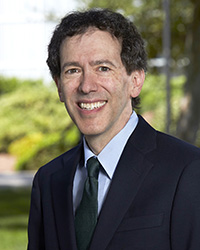Second Opinions
With both legal and medical degrees, professor Orentlicher shares his perspective on healthcare law

By Stacy Willis
When the U.S. Supreme Court overturned Roe v. Wade in June, professor David Orentlicher was uniquely qualified to analyze the controversial decision from the intersection of health care, ethics, public policy, and law.
Orentlicher, the Judge Jack and Lulu Lehman Professor of Law at the William S. Boyd School of Law at UNLV and director of the UNLV Health Law Program, has an M.D. from Harvard Medical School and a J.D. from Harvard Law School. He served in the Indiana House of Representatives from 2002 to 2008, and he was first elected to the Nevada Assembly in 2020.
“You’ve got very important interests on both sides,” Orentlicher says. “And as people balance those interests, they draw a line at different points during gestation.”
In 1973’s Roe, the Supreme Court ruled broadly that there is a constitutional right to privacy that includes the right to an abortion. Striking down Roe and writing the 6-3 majority opinion in Dobbs v. Jackson Women’s Health Organization, Associate Justice Samuel Alito called that reasoning “plainly incorrect.”
Orentlicher disagrees: “The idea that there is no constitutional basis [to the right to privacy] reflects a misunderstanding of legal principles. … The Roe Court properly recognized a fundamental interest in making reproductive choices that includes a right to abortion. …
“One way to think about abortion is to say the pregnant woman is sustaining the life of the fetus. In other contexts, we don’t impose obligations on one person to come to the aid of another—even another person—to sustain their life to that degree. … ”
For example, he says the law would never compel a parent to donate a kidney or stem cells to their child who needs a kidney transplant or bone marrow transplant. Most parents would gladly step up for their children, but they aren’t required, he says.
In his sixth year at Boyd Law, Orentlicher previously taught at Indiana University McKinney School of Law. He chose UNLV because he liked the law school’s faculty, smaller size, sense of community, and its Southwestern locale. Seeing the politically purple Nevada turning bluer, the Democrat also felt he could contribute more to social progress here than in the solidly red Indiana.
So what does this attorney, physician, professor, and lawmaker do for fun?
“I like to dance,” Orentlicher says. “I particularly like to Cajun dance. I clerked in Louisiana after law school, and I took Cajun dancing lessons. It’s harder to find Cajun bands here, but fortunately, Cajun dancing works well with other music.”